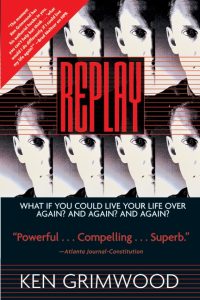
Prior to having my recent bypass surgery, I bought a copy of my favorite book, Ken Grimwood’s Replay, to re-read. I’ve written before about how much Replay meant to me, but I thought it would be especially interesting to re-read now in light of (a) I am now past the age of Grimwood when he wrote the book, (b) I am roughly the age of its main protagonist, Jeff Winston, and (c) I was in some small danger of dying, either through a heart attack before I ever got on the operating table or there itself.
Even though I knew the twists and turns of the plot, the narrative continued to hold me. I had loaned the book to a close female friend in recent years who had commented that it had a lot of sex in it (which somewhat turned her off, as it was a very male-centric view of sex), which I hadn’t remembered, but which I was aware of this time through. It definitely was male-centric, as it is Winston who provides the internal awareness throughout the first half of the book, and in one of his many replays he goes through a very hedonistic phase. Now that I’m over forty, Winston’s actions actually seem more realistic than when I read it in my twenties. There’s a reason for the June-December romance in our culture, where women are attracted by older men for their money–Winston, in his replays, is always able to make enough quick bets on sporting events to have a sizable bank account in his youth, which enables him to attract such women earlier in his life. What is revealing here is not that Winston seeks out sex in such a way, but that Grimwood makes it a point that such a lifestyle is as hollow as his first replay, where he simply accumulated a vast amount of wealth and prestige. When Winston discovers that there is someone else in the world who is replaying like him, he seeks her out and over time they become many-lives-long soul partners because of their shared experience.
Grimwood also was somewhat prescient about the U.S., terrorism, and how the latter could easily turn the former into a fascist state, by giving us one replay where Winston and Pam actually reveal themselves to the world, only to be co-opted by the government who disbelieves in their story, but keeps them under lock and key, including torture techniques, to get them to reveal the “secrets” of the world. Even though Jeff and Pam provide details that remove certain strong-man governments from power (in the 80s, when this was written, Grimwood’s target was Qaddafi in Libya), new terrorist groups form based on the covert U.S. actions, thus starting an overall change in the timeline that Jeff and Pam are unable to provide any details for because it is unlike any replay they’ve been through. For me, that’s the profound illustration of my objection to Bush’s tactics since 9/11. Rather than capitalizing on the world sentiment and sympathy for that horrible day to truly direct world opinion against such meaningless violence, Bush and his advisors instead chose the worst possible options of vengeance (in Afghanistan) and pre-emption (in Iraq; let me remind you that Hussein had no use for Al Quaedi, nor that group for him, which seems to continue to be lost in the nattering nabobs of 24-hour opinion news). The atrocities committed in the name of the U.S.’s revenge have only strengthened terrorism, undermined our legal system, and removed any sympathy the globe may have had for us. It may have even contributed to our recent economic troubles, as the continued cost of the occupation of Iraq has been an awful drain. Grimwood saw such a possibility in the 1980s.
Ever since reading Replay for the first time, I’ve said that this is the most “life-affirming” book I know of, and it remains so. Winston’s discovery through his many lives (and constant deaths) is that life is worth living right in the moment, but by that Grimwood doesn’t mean “for the moment.” The motto of this book is not carpe diem, but carpe vitam. It’s an important distinction. The former is the refuge of people who think of nothing beyond themselves, in a sense that every day must be conquered and enjoyed and provide fulfillment. Grimwood says, yes, but a day by itself means nothing if it’s not surrounded by a life that has meaning, typically shared with others.
SPOILER WARNING
That ending remains as powerful as ever, as Winston dies over and over and over again before the change, and the denouement is as open to interpretation as is the epilogue. If anything, it’s that ending, which could not be anything else, that makes this book so fulfilling, so much so that I hadn’t even remembered the one page epilogue. Obituaries stated that Grimwood had been working on a sequel to Replaywhen he died, and now I can see what possibilities he had open to him for such, as an exploration of a time and place and a character that was more distant than Jeff Winston and the U.S. of the 1980s. It would have been a difficult book to write well, but I’m sure Grimwood wouldn’t have published it if he didn’t believe in it. I’m saddened that we’ll never see that book.
[Finished 4 October 2008]
